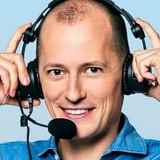contents
The choice of Marco Sieber speaks for his abilities: He is a doctor, works as a urologist at the Biel Hospital and is also on duty as an emergency doctor with Air Glacier. A top candidate, as an Esa insider called him. This is essential. However, as always, a political component may have played a part. From a Swiss point of view, this appointment was long overdue.
Claude Nicollier was selected by the European Space Agency (ESA) in 1978 for the first group of European astronauts. Nicollier has traveled into space four times on the Space Shuttle, completing an eight-hour spacewalk on the last mission to service the Hubble Space Telescope.
44 years have passed
But an incredible 44 years have passed since Nicollier’s election. Switzerland is one of the founding nations of Esa and finances the organization with a considerable amount every year. Last year it was around 180 million Swiss francs.
Significantly more than, for example, the Netherlands, which, by the way, has already provided two astronauts. One could therefore have justified hopes that it would work this time if highly qualified applications were received from Switzerland.
Exciting phase
Now Switzerland has a new astronaut, Claude Nicollier a successor. And Marco Sieber takes up his position at a very exciting time. The Artemis program from Nasa and Esa has started and is expected to bring people back to the moon by 2025. After that, a space station is to be built in orbit and a permanent base set up on the lunar surface.
But the moon should only be an intermediate station. From there, NASA wants to send people to the red planet by 2030. And at the same time, Esa has just doubled its budget to 15.2 billion euros for next year. Sometimes she harbors the desire to set up her own manned space program.
Whether Sieber first travels to the International Space Station ISS in Earth orbit or even hoists the Swiss flag on the moon is secondary. The fact is that from now on entire generations of young people are growing up in our country in an age in which a Swiss travels into space. The federal government hopes that this will give the so-called MINT subjects mathematics, computer science, natural sciences and technology an enormous boost.
When will the first Swiss female astronaut arrive?
It would have been even nicer if Switzerland could have provided a woman. Especially in the MINT subjects, women are still significantly underrepresented at the moment. A Swiss astronaut would probably have a much greater influence here. This is a missed opportunity.
But a Swiss person in space will certainly fascinate many young schoolchildren, which will arouse their interest in the subject. And thus also increases the chances of a first Swiss female astronaut in the future.
